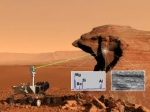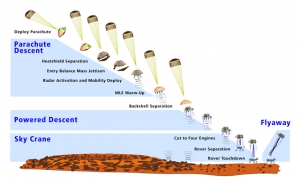Displaying items by tag: Curiosity (rover)
Chemistry and Camera complex instrument (ChemCam)
Chemistry and Camera complex (ChemCam) is a suite of remote sensing instruments on Mars for the Curiosity rover.
As the name implies, ChemCam is actually two different instruments combined as one: a laser-induced breakdown spectroscopy (LIBS) and a Remote Micro Imager (RMI) telescope. The purpose of the LIBS instrument is to provide elemental compositions of rock and soil, while the RMI will give ChemCam scientists high-resolution images of the sampling areas of the rocks and soil that LIBS targets. The LIBS instrument can target a rock or soil sample from up to 7 m (23 ft) away, vaporizing a small amount of it with about 50 to 75 5-nanosecond pulses from a 1067 nm infrared laser and then observing the spectrum of the light emitted by the vaporized rock.
ChemCam has the ability to record up to 6,144 different wavelengths of ultraviolet, visible, and infrared light. Detection of the ball of luminous plasma will be done in the visible, near-UV and near-infrared ranges, between 240 nm and 800 nm. The first initial laser testing of the ChemCam by Curiosity on Mars was performed on a rock, N165 ("Coronation" rock), near Bradbury Landing on August 19, 2012.
The ChemCam team expects to take approximately one dozen compositional measurements of rocks per day.
Jet Propulsion Laboratory (JPL)
The Jet Propulsion Laboratory (JPL) is a federally funded research and development center and NASA field center located in California, USA. JPL is managed by the nearby California Institute of Technology (Caltech) for the National Aeronautics and Space Administration (NASA).
The Laboratory's primary function is the construction and operation of robotic planetary spacecraft, though it also conducts Earth-orbit and astronomy missions. It is also responsible for operating NASA's Deep Space Network.
Among the Laboratory's major projects are the Mars Science Laboratory mission (which includes the Curiosity rover), the Cassini–Huygens mission orbiting Saturn, the Mars Exploration Rovers (Spirit and Opportunity), the Mars Reconnaissance Orbiter, the Dawn mission to the dwarf planet Ceres and asteroid Vesta, the Juno spacecraft en route to Jupiter, the Gravity Recovery and Interior Laboratory (GRAIL) mission to the Moon, the Nuclear Spectroscopic Telescope Array (NuSTAR) X-ray telescope, and the Spitzer Space Telescope.
The MSL mission (Mars Science Laboratory)
The Mars Science Laboratory (MSL) is a National Aeronautics and Space Administration (NASA) mission with the aim to land and operate a rover named Curiosity on the surface of Mars.
The MSL was launched November 26, 2011 at 10:02 am EST and will land on Mars at Gale Craterbetween August 6 and August 20, 2012. It will attempt to perform the first-ever precision landing on Mars. The rover Curiosity will help assess Mars' habitability, that is, whether Mars is, or ever was an environment able to support microbial life. It will also analyze samples scooped up from the soil and drilled powders from rocks.




